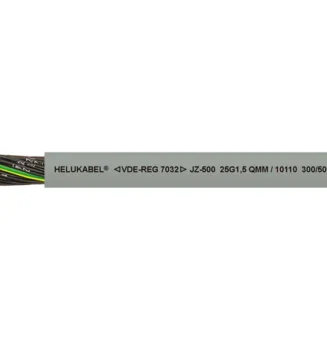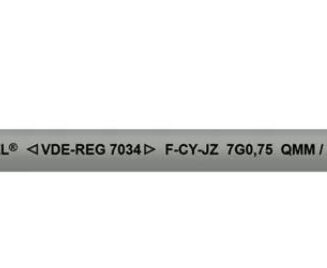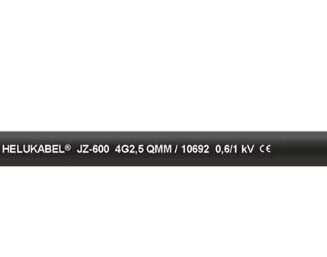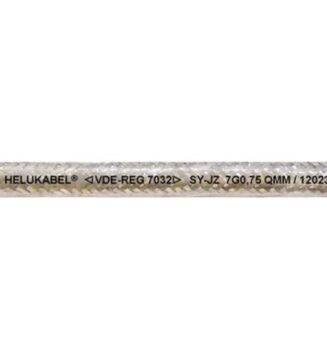-

| Description |
PVC control and connection cable in alignment with DIN VDE
0285-525-2-51 / DIN EN 50525-2-51 |
| Cable Structure |
Copper wire bare, finely stranded acc. to DIN VDE 0295 Class 5 / IEC 60228 Class 5 • Core insulation: PVC, compound type Z 7225 • Core identification acc. to DIN VDE 0293-334, black cores with consecutive labeling in white digits • Protective conductor: starting with 3 cores, G = with protective conductor GN-YE, in the outer layer, x = without protective conductor (OZ) • Cores stranded in layers with optimal lay lengths • Outer sheath: PVC acc. to DIN VDE 0207-363-4-1 / DIN EN 50363-4-1 (compound type TM2) • Sheath colour: grey (RAL 7001) • Length marking: in metres |
| Test |
flame-retardant acc. to DIN VDE 0482-332-1-2 / DIN EN 60332-
1-2 / IEC 60332-1-2
certifications and approvals:
EAC
VDE-Reg.-No. 7032, valid for temperature range up to +70°C |
| Application |
Used for flexible applications involving medium mechanical stress
with free movement, without tensile stress and without forced
motion control in dry, damp and wet rooms, however, not suitable
for outdoor use. Used as a connection and control cable in machine
tools, assembly lines and conveyor belts, production lines, in plant
construction, air-conditioning technology, in smelters and steel
mills. Select PVC comp |
-

|
|
| Description |
PVC control and connection cable in alignment with DIN VDE 0285-525-2-51 / DIN EN 50525-2-51 |
| Cable Structure |
Copper wire bare, finely stranded acc. to DIN VDE 0295 Class 5 / IEC 60228 Class 5
Core insulation: PVC, compound type Z 7225
Core identification acc. to DIN VDE 0293-334, black cores with consecutive labeling in white digits
Protective conductor: starting with 3 cores,
G = with protective conductor GN-YE, in the outer layer,
x = without protective conductor (OZ)
Cores stranded in layers with optimal lay lengths
Foil wrapping
Screen:
1 core(s): helically wound tinned copper wires, approx. coverage 85 %
2 – 100 core(s): braided screen of tinned copper wires, approx. coverage 85 %
Outer sheath: PVC acc. to DIN VDE 0207-363-4-1 / DIN EN 50363-4-1 (compound type TM2)
Sheath colour: grey (RAL 7001)
Length marking: in metres |
| Test |
flame-retardant acc. to DIN VDE 0482-332-1-2 / DIN EN 60332-1-2 / IEC 60332-1-2
certifications and approvals:
2 – 100 core(s): EAC
2 – 100 core(s): VDE-Reg.-No. 7034, valid for temperature range up to +70°C |
| Application |
For flexible use with free movement without tensile stress or forced movements in dry, moist and wet rooms but not outside; to be used as control and connecting cable in control and regulation technology, in the tool and machine building industry, in computer systems, as well as a signal cable in the electronic industry. A stabilizing foil separator between wire bound and braid reduces the outer diameter essentially and allows for smaller bending radius as well as lower weights. The disturbance free transmission of signals and impulses is ensured due to the high degree of screening. EMC = Electromagnetic Compatibility; in order to optimise EMC properties, we recommend a double-sided and all-round large contact area of the copper braiding. |
|
|
|
|
-
| Description |
UV resistant
For outdoor use
Largely oil resistant
For outer diameters larger than 18.00mm, suitable for direct burial
Versatile use in many industries, particularly in machine and plant construction |
| Application |
Used as a connection and control cable in machine tools, assembly lines and conveyor belts, production lines, in plant construction, heating and air-conditioning technology, in smelters and steel mills. Suitable for flexible applications involving medium mechanical stress with free movement, without tensile stress and without forced motion control in dry, damp and wet rooms, as well as outdoors (fixed installation). May not be laid directly in soil (suitable for direct burial starting with an outer diameter of 18.0 mm) or water. |
-
| Description |
largely oil resistant
transparent outer sheath
with PVC inner sheath
galvanised steel wire braid to protect against mechanical damages
versatile use in many industries, particularly in machine and plant construction |




